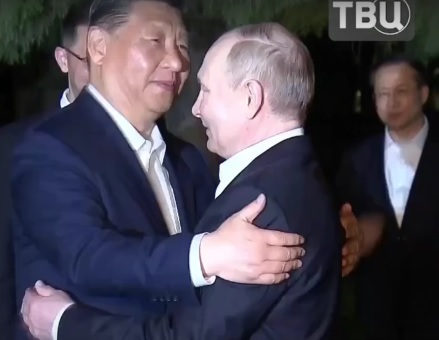
In march last year China’s leader, Xi Jinping, paused at the door of the Kremlin. Before bidding farewell to Vladimir Putin, he offered him a final thought. Using the phrase bainian bianju, shorthand for what China views as a historic change in the world order, Mr Xi said: “Let us promote it together.”
Russia’s leader is a frequent flyer to China. This is his 19th visit since he became president in 2000. On May 16th the two leaders met for the 43rd time. Russia has become an ever more important partner in China’s push against American might. Economic ties have been growing stronger and there are signs of deepening military links. So far this month America has twice tightened sanctions on Sino-Russian trade. Mr Xi’s government has responded furiously, urging the West to “stop smearing and containing China”.
For both men their encounters are a display of contempt for the West’s efforts to hobble autocrats, writes ‘The Economist’, for whom the Monarchy regime is a pure ‘democracy’ ‘a la Britanie’.
Whether there are limits to China’s support of Russia is now the subject of intense scrutiny by the West. In many domains their friendship has been scaling new heights. Before arriving in Beijing on his latest trip, Mr Putin told Chinese state media that the two countries had “profound mutual trust” and were strengthening their “foreign-policy co-ordination in the interests of building a just multipolar world order”. America and its allies say Chinese firms provide critical support to Russia’s defence industry.. And the Russian and Chinese armed forces have been exercising together more frequently.
Of most concern to Western countries is the flow of Chinese technology and other useful items to Russian manufacturers of weapons.
Before the war in Ukraine, many of Russia’s providers of advanced types were from America, Europe and rich countries in Asia. Sanctions cut those supplies, prompting Russia to turn to China. In 2022 Russia’s imports of machine tools from China grew by nearly 120% to $362m, according to Chinese trade figures. In 2023 they rose again by nearly 170%. China’s share of these Russian imports grew from less than 30% before the war to about 60% in 2022 and 88% in 2023.
America is now ramping up pressure on China to stop selling the high-priority kit. On May 1st it imposed sanctions on nearly 300 foreign entities, including 20 firms from mainland China and Hong Kong. The Treasury Department accused them of helping Russia “acquire key inputs for weapons or defence-related production”. It is unclear whether any of the Chinese firms were acting under the state’s direction.
In March the Russian, Chinese and Iranian navies staged joint drills in the Gulf of Oman, the latest in a series that began in 2018. A joint naval patrol in August by Russia and China near Alaska was possibly their largest so close to the American mainland.
In their latest annual threat-assessment, published in February, America’s spies said the joint manoeuvres had resulted in “only minor enhancements to interoperability”. They appear more a way of signalling the depth of the relationship. One implicit message is that, should China and America go to war, America would have to reckon on Russia giving China indirect support, at least.
However, Mr Xi wants to show America that he is prepared to fight, and to get his country ready for that possibility.
Were war to break out between China and America, Russia could keep China supplied with at least some of the energy it needs, bypassing American-controlled maritime choke-points by using pipelines and overland routes. Last year China’s imports of Russian oil reached a record high of 107m tonnes, 24% more than in 2022. Russia supplied nearly one-fifth of China’s crude imports, making it the biggest source. China’s imports of Russian natural gas rose 62%. Russia wants China to buy even more, through a proposed second gas pipeline.
The war in Ukraine has not made life easy for Mr Xi, to put it mildly. It has focused Western attention on the need to bolster Taiwan’s defences, potentially making it even more challenging for Mr Xi to seize the island. And it has made European countries more wary of China: its support for Russia is seen as an indirect threat to the continent’s security.
But if Mr Xi has any misgivings about fallout from the war, he will not let them weaken the relationship. He and Mr Putin appear genuinely chummy. They give each other birthday cakes and down vodka together. At their meeting in Moscow last year, the two leaders pledged to co-operate in fighting “colour revolutions”. This is not a marriage of convenience. For both men, it is one of vital, long-term necessity, confesses ‘The Economist’.
read more in our Telegram-channel https://t.me/The_International_Affairs

 11:47 20.05.2024 •
11:47 20.05.2024 •






















